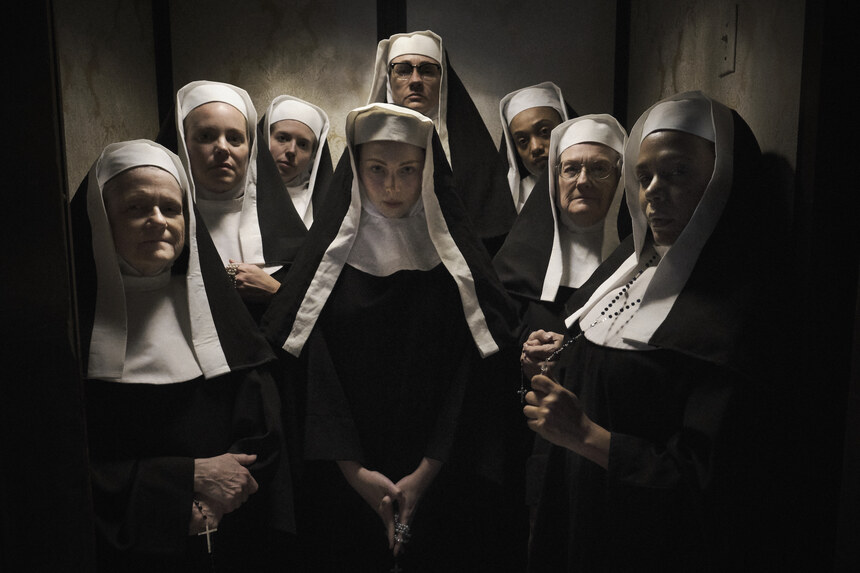Tribeca 2021 Review: AGNES, Exorcism, Anger, Faith, and Sandwich Dissection

What does it mean to have faith? What does it mean to be driven insane? These two questions might come from very similar places in the human psyche. This is especially true for those with little power or agency over their own lives, whether they give up that agency voluntarily or not. Perhaps the true test of faith comes to those for whom all hope is lost, when they alone and unheard, with nothing left to lose.
Prolific underground filmmaker Mickey Reece has focused his narratives on people who live in their own strange island worlds within America, where everything from everyday manners to expressions of love to dangerous monsters seem to be just enough outside the norm to be both quirky and frightening. His new feature Agnes straddles both this world he has carved, and something more akin to familiar American indie cinema, with a story that is as poignant as it is off-kilter.
At rural convent, young Sister Agnes (Hayley McFarland) seems to have gone insane: she starts shouting obsenities at her fellow nuns, foaming at the mouth and becoming violent to the point of beign strapped down. Mother Superior (Mary Buss) calls the diocese; but those in charge has little time or interest in the convent, and so they send Father Donaghue (Ben Hall), one of the few of the church to be a trained Exorcist, in the hopes that he will fail and they will have an excuse to excommunicate him. He brings with him the young Ben (Jake Horowitz), still wet behind the ears and full of Catholic proverbial piss and vinegar.
The nuns at the convent are an eclectic bunch, ranging from the overbearing and overly pious Mother Superior, to the naive and starry-eyed Sister Honey (Zandy Hartig), to the sardonic Sister Ruth (Rachel True). But at the heart of this mystery are Agnes and her friend Sister Mary (Molly C. Quinn), a young woman whose faith was shaken when she lost her baby, and whom understands that Agnes might be possessed by a devil, but her anger comes from a place of genuine trauma.
The first half of the story takes place in the oddball universe of Reece's previous films; everyone talks in a way that is slightly off-kilter and almost out-of-synch, not quite in step with the real world. This makes sense in this convent, shut away from the outside, with nuns who are there for different reasons and with different purposes. Mother Superior, Farher Donaghue, both have their agendas which only temporarily align, and at the centre of it lies Agnes, whom no one seems willing to genuinely understand, caught up as they each are in their own agenda. Reece and co-writer John Selvidge keep us within this confined space as if the outside world doesn't exist (which again stays true to location), but the fallback of which is that no one knows quite how to conduct themselves, leading to disaster.
The second half shifts to something we might more readily recognize, a shift that moves us from oddball fascination to a more serious introspection. Now thrust back into the real world that she had tried to escape in the convent, Mary is isolated both by her status as a former nun, and the past life and pain she tried to erase. Her trauma made her seek solace and meaning in faith; but that faith was quickly shattered, and reality and its inhabitants are doing nothing to restore it.
The story leans as much into Agnes of God as it does The Exorcist, and this is to its benefit. Reece seems to be stepping a bit outside his comfort zone; while we have one foot in his American rural self-contained strangeness, the (arguably equally strange) world that most inhabit, what one would think is a refuge, becomes just as much a place of burden, even more so. Mary becomes invisible to herself, unable to reconcile what happened to her friend, how both of their traumas were dismissed, and how she feels abandoned by her god.
Hall and Buss, having worked with Reece before, give performances that fit like gloves, that both engage and disturb the audience; adding in True and Sean Gunn in the last act, they add nice touches of kindess and thinly-veiled cynicism. Quinn is a true standout, walking the line of a young woman who has seen far too much for her young years and still navigating waters far deeper and turbulent than she should have to.
In the convent, the tight walls and rooms are at first a comfort, and then a prison; cinematographer Samuel Calvin (Climate of the Hunter) gives us right tones, deep shadows, and slowly closes the walls in as Agnes' demon is loosed upon those who would cure her. In the outside world, there is almost too much light, or a brightness that bears too much witness to Mary's loneliness. The story becomes like a chamber piece, with one side pleading for order while the other encourages chaos, until only one instrument is left proverbially standing, not knowing how to perform a solo piece.
Discordant and fascinating, bizarre and deeply affecting, Agnes marks an intriguing and strong step in Reece's filmography. Moving between outrage, love, cynicism, and loneliness, it follows a lost woman trying to recover why she might never have had, and the forces that surround her, those who would take and those that try to give.







